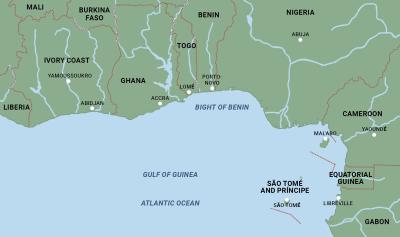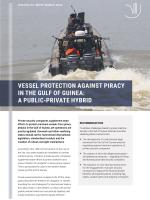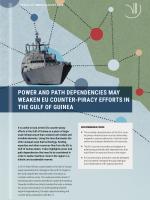Vessel protection against piracy in the Gulf of Guinea: a public private hybrid
According to the 1982 UN Convention on the Law of the Sea, only state vessels are mandated to combat maritime piracy. However, private security companies supplement state efforts to protect seafarers and ensure freedom of navigation in piracy-prone regions. This is particularly the case in the western Indian Ocean and the Gulf of Guinea.
To address challenges related to private maritime security in the Gulf of Guinea, Denmark and other seafaring states could promote:
- The development of a harmonised legal framework for the Gulf of Guinea aimed at regulating regional maritime operations of private security companies.
- The creation of strict due diligence processes – and adherence measures – regarding the hiring and licensing of private security companies.
- The adoption of cost-sharing mechanisms for the engagement of private security companies to balance the financial burden between all impacted parties, including flag states, coastal states and shipping companies.
Private vessel protection rocketed in the 2010s, when piracy disturbed the freedom of navigation of vessels transiting the vital chokepoint for international trade in the Indian Ocean. In this theatre, no ships with armed guards onboard were ever successfully hijacked, and private protection was deemed largely effective.
In the Gulf of Guinea, the situation is different both legally and geographically. As Denmark has an estimated 30-40 vessels within the Gulf of Guinea at any given point, this calls for renewed consideration of how to manage private security operations at sea.
The Gulf of Guinea theatre
The Gulf of Guinea became a global piracy hotspot between 2015 and 2020, with 95% of all attacks globally taking place in the Gulf of Guinea in 2020. The waters mainly affected are off the coast of Nigeria, Togo and Benin, with Nigeria as the epicentre. Inadequate maritime surveillance and law enforcement, coupled with increasingly violent attacks, have led some merchant vessels to rely on private protection.
Vessel protection by private security companies includes many services. Security companies offer armed protection of, for example, merchant ships, fishing vessels and private yachts sailing in risk-prone waters. Examples include armed guards embarked on vessels transiting the Indian Ocean and providing escort vessels in some parts of the Gulf of Guinea.
Private security companies also protect permanent installations at sea, such as off-shore oil and gas platforms, and offer clients intelligence and risk assessments, as well as training.
Hybrids also exist where public and private security collaborate on the same operation. The Netherlands and France have historically offered to deploy military personnel onboard merchant vessels flying their flag.
The Gulf of Guinea also employs such public-private hybrids. In the past, military personnel in states like Togo, Benin and Nigeria would be hired by shipping companies to embark merchant vessels entering their territorial waters to offer protection. Today, various services exist. Togo, Benin and Cameroun provide secure anchorage sites and naval escorts to protect merchant ships within their respective territorial waters. Nigeria has approved select companies that offer private escort vessels sailing with Nigerian Navy personnel onboard alongside merchant ships in its territorial waters.
To cater to the persistent security gap, the region developed protection services in new public-private security constellations (see Box 1). For instance, the Nigerian, Togolese and Beninois navies began offering embarked military personnel at a fee. By 2017, this model began to fade when Nigeria started to strongly enforce its existing policy against embarked armed guards of any kind – whether private security or public military personnel. The government instead licensed specific private military security companies (PMSCs), today about 50 in number, which shipping companies may contract to provide escort vessels. The vessels must be manned and commanded by Nigerian Navy personnel, who operate under national rules of engagement.

The public-private constellation seems an acceptable compromise. For Nigeria, it allows the state to retain its monopoly over the use of force and remain the primary actor in safeguarding its territorial waters. Moreover, because navy personnel operate on private security vessels, the state’s limited number of patrol vessels are freed up for other tasks.
For merchant shipping, the constellation provides vessels the needed protection without the burden of embarking private armed guards, which is generally resisted by the industry.
The model is likely to stay for as long as Nigerian naval resource and capability limitations impede the state’s ability to effectively address piracy in its waters. However, it arguably also provides an incentive for the state to remain in a status quo, since the state both saves and makes money on this constellation.
Moreover, several conditions complicate the use of private security in the Gulf of Guinea. Merchant vessels transiting the region call on multiple ports along the coast. This firstly means that they sail into coastal states’ territorial waters, where laws are more restrictive than on the high seas – no state in the Gulf of Guinea region (or elsewhere for that matter) readily allows private security companies to operate and carry arms within their territory. Secondly, vessels transit multiple states’ territorial waters, which only complicates the already restrictive regulation.
These conditions have led to a number of arrests and weapons seizures – of private security actors. For example, in 2013 when private armed guards were found onboard vessels off Senegal and in 2019 when Nigerian authorities claimed that a private security detachment was within its territorial waters.
Official voices in international shipping remain reluctant on the role of private security, and there is a lack of agreement on binding regulation.
The widespread reliance on private security at sea led to a shift in the International Maritime Organisation’s (IMO) position on private security. From strongly discouraging private vessel protection in the 1990s, it now takes a neutral stance, neither endorsing nor condemning the reliance on private security.
Much like the IMO, organisations like the Baltic and International Maritime Council (BIMCO) and the Oil Companies International Marine Forum (OCIMF) find private solutions contentious and do not directly recommend the engagement of private security.
International regulation of a binding nature does not exist thus far, although there have been attempts to regulate some aspects of private security. In September 2017, an open-ended intergovernmental working group was established to deliberate the content of an international framework on the Regulation, Monitoring and Oversight of Private Military and Security Companies. However, the process is not yet finalised and is unlikely to result in a legally binding instrument.
The Montreux Document, with Denmark as a participating state, provides governments with broad guidance on how to effectively regulate Private Military Security Companies (PMSCs). The document was adopted through the consensus of 17 states, including Denmark. However, it is not legally binding.
Private security critique
Several potential challenges exist with outsourcing a state’s governance obligations to private companies. Conventionally understood as a public good, security as a commodity can challenge democratic principles, as private companies are not as accountable as a state. This inserts an array of risks concerning responsibility and liability.
Politically, transparency is an issue with practices of contracting and sub-contracting – and the lack of public debate and scrutiny – because a shipping company’s hiring of private security does not entail political processes, as when public forces are deployed. This opacity also plays out in the Gulf of Guinea. Although public actors are involved in all instances of contracting PMSCs (as in the case of Nigeria), questions remain about which criteria exist for vetting and licensing PMSCs. For instance, no due diligence can be conducted on naval personnel embarked on escort vessels to determine their level of preparedness for addressing piracy incidents. Yet, it is known that only a handful of the 50 vetted companies are fully operational with the necessary fuel, vessels and availability of spare parts in case of damage. Furthermore, for regional navies providing vessel escort, not all patrol vessels are purpose-built, which sometimes impedes their ability to provide effective protection.
Legally, private armed guards are not permitted in the territorial waters of Gulf of Guinea states. Moreover, private security companies are not directly bound by human rights law, unless states practice (their legal obligation to conduct) due diligence and hold companies to account to relevant treaties, in this case by way of the shipping employer (see Box 2). It is therefore the individual flag state that must manage the governance of private security, leading to differences in requirements for private security companies. With the industry’s common practice of open ship registries – known as flags of convenience – regulation also remains unclear, scattered and often unrestrictive. Concerns include ensuring oversight regarding company licencing, private security operations’ handling of weapons or adherence to international standards and obligations under international law, for instance, during an exchange of fire.
Economically, private protection may also be a logistical and financial burden for vessels transiting multiple Gulf of Guinea states. This requires contracting and arranging navy escorts or secure anchorage services across multiple states (see map). Questions also remain as to who should bear the cost of engaging private maritime security companies. For instance, if costs are borne by flag states, they might pay closer attention to vessel registration procedures to ensure that vessels have adequate security and safety measures in place. If the costs are borne by the coastal state, this might incentivise authorities to be more proactive about counter-piracy efforts. Costs borne by shipping companies are often merely tolerated and then passed on to consumers. Distributing the cost burden more evenly could therefore create a fair balance of incentives across the multiple actors involved in or directly impacted by counter-piracy efforts.
What now?
The number of piracy incidents in the Gulf of Guinea has declined considerably since 2020. This is in part ascribed to the increased focus on naval surveillance and patrol, hereunder the public-private hybrid. However, there is a wide concern that a wave of attacks may return from one day to the next as long as motives and means remain. If existing public-private security hybrids continue, their challenges must be solved.
For seafaring states like Denmark, there is a clear need to advocate for a harmonised legal framework in the Gulf of Guinea aimed at regulating the operations of PMSCs and the public-private hybrid currently consolidating in the region. This framework could incorporate international standards for the operation of PMSCs in the region, including operational procedures and accountability mechanisms.
Advocacy for agreeing on the instrument for the Regulation, Monitoring and Oversight of Private Military and Security Companies is needed.
Furthermore, the creation of – and measures for strict adherence to – due diligence processes are needed regarding the licensing of PMSCs in regions like Nigeria and when they are hired by shipping companies. At all levels, transparency is key in ensuring both accountability and adherence to international legal frameworks and norms.
Finally, clear guidelines also need to be established on cost-sharing mechanisms for the engagement of PMSCs, including effectively balancing the financial burden between operators, charterers and, where possible, regional states.
This policy brief is part of the project ‘Counter-Piracy Infrastructures in the Gulf of Guinea’ (COPIGoG), kindly funded by a grant from the Danish Ministry of Foreign Affairs and administered by the Danida Fellowship Centre. It draws on discussion at the DIIS seminar Countering piracy in the Gulf of Guinea: What role for private armed guards? held in October 2023 and on inputs from various experts in the field, whom the authors wish to thank.
DIIS Experts



